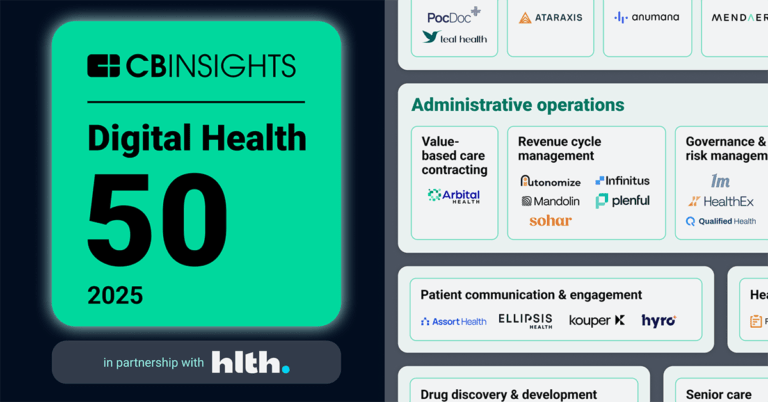
SafelyYou
Founded Year
2015Stage
Series C | AliveTotal Raised
$90.87MLast Raised
$43M | 10 mos agoMosaic Score The Mosaic Score is an algorithm that measures the overall financial health and market potential of private companies.
+159 points in the past 30 days
About SafelyYou
SafelyYou focuses on artificial intelligence and healthcare technology within the senior living sector. The company provides solutions to monitor and enhance the safety and care of seniors, particularly those with dementia, by offering real-time fall detection, video monitoring, and remote clinical support. Its products aim to address falls and associated emergency room visits and may influence clinical outcomes and operational efficiency in senior care facilities. It was founded in 2015 and is based in San Francisco, California.
Loading...
ESPs containing SafelyYou
The ESP matrix leverages data and analyst insight to identify and rank leading companies in a given technology landscape.
The remote fall detection tech market includes technologies that detect falls and alert caregivers in remote settings, primarily in home or elderly care environments. Also known as fall alert systems, these solutions use sensors, wearables, or cameras combined with advanced algorithms to distinguish between normal activities and falls. The market addresses challenges of reducing response time to f…
SafelyYou named as Leader among 15 other companies, including CarePredict, Healthcare Integrated Technology, and Nymbl Science.
Loading...
Research containing SafelyYou
Get data-driven expert analysis from the CB Insights Intelligence Unit.
CB Insights Intelligence Analysts have mentioned SafelyYou in 1 CB Insights research brief, most recently on Oct 20, 2025.

Oct 20, 2025 report
Digital Health 50: The most promising digital health startups of 2025Expert Collections containing SafelyYou
Expert Collections are analyst-curated lists that highlight the companies you need to know in the most important technology spaces.
SafelyYou is included in 3 Expert Collections, including Digital Health.
Digital Health
12,122 items
The digital health collection includes vendors developing software, platforms, sensor & robotic hardware, health data infrastructure, and tech-enabled services in healthcare. The list excludes pureplay pharma/biopharma, sequencing instruments, gene editing, and assistive tech.
Artificial Intelligence (AI)
20,894 items
Digital Health 50
50 items
SafelyYou Patents
SafelyYou has filed 3 patents.
The 3 most popular patent topics include:
- artificial intelligence
- artificial neural networks
- computational neuroscience

Application Date | Grant Date | Title | Related Topics | Status |
|---|---|---|---|---|
12/29/2023 | 3/25/2025 | Artificial neural networks, Machine learning, Artificial intelligence, Linear algebra, Computational neuroscience | Grant |
Application Date | 12/29/2023 |
|---|---|
Grant Date | 3/25/2025 |
Title | |
Related Topics | Artificial neural networks, Machine learning, Artificial intelligence, Linear algebra, Computational neuroscience |
Status | Grant |
Latest SafelyYou News
Oct 23, 2025
Headlines alternate between massive AI investments and reports of failed deployments. The pattern is consistent across industries: seemingly promising AI projects that work well in testing environments struggle or fail when deployed in real-world conditions. It's not insufficient computing power, inadequate talent, or immature algorithms. I've worked with over 250 enterprises deploying visual AI—from Fortune 10 manufacturers to emerging unicorns—and the pattern is unmistakable: the companies that succeed train their models on what actually breaks them, while the ones that fail optimize for what works in controlled environments. The Hidden Economics of AI Failure When Amazon quietly rolled back its “Just Walk Out” technology from most U.S. grocery stores in 2024, the media focused on the obvious: customers were confused, technology wasn't ready, labor costs weren't eliminated as promised. But the real lesson was subtler and more valuable. Amazon's visual AI could accurately identify a shopper picking up a Coke in ideal conditions—well-lit aisles, single shoppers, products in their designated spots. The system failed on the edge cases that define real-world retail: crowded aisles, group shopping, items returned to wrong shelves, inventory that constantly shifts. The core issue wasn't technological sophistication—it was data strategy. Amazon had trained their models on millions of hours of video, but the wrong millions of hours. They optimized for the common scenarios while underweighting the chaos that drives real-world retail. Amazon continues to refine the technology—a strategy that highlights the core challenge with visual AI deployment. The issue wasn't insufficient computing power or algorithmic sophistication. The models needed more comprehensive training data that captured the full spectrum of customer behaviors, not just the most common scenarios. This is the billion dollar blind spot: Most enterprises are solving the wrong data problem. Focusing on the right data, not just more data Enterprises often assume that simply scaling data—collecting millions more images or video hours—will close the performance gap. But visual AI doesn't fail because of too little data; it fails because of the wrong data. The companies that consistently succeed have learned to curate their datasets with the same rigor they apply to their models. They deliberately seek out and label the hard cases: the scratches that barely register on a part, the rare disease presentation in a medical image, the one-in-a-thousand lighting condition on a production line, or the pedestrian darting out from between parked cars at dusk. These are the cases that break models in deployment—and the cases that separate an adequate system from a production-ready one. This is why data quality is quickly becoming the real competitive advantage in visual AI. Smart companies aren't chasing sheer volume; they're investing in tools to measure, curate, and continuously improve their datasets. advertisement First-hand experience As the CEO of a visual AI startup—Voxel51—these challenges are something I've lived first-hand. My co-founder and I started the company after seeing how bad data derails AI projects. In 2017, while working with the city of Baltimore to deploy vision systems on its CitiWatch camera network to aid first responders, we experienced the pain of creating datasets, training models, and diagnosing failures without the right tools. That work inspired us to build our own platform, which became FiftyOne —now the most widely adopted open source toolkit for visual AI with more than three million installs. Today, more than 250 enterprises, including Berkshire Grey, Google, Bosch, and Porsche, use it to put data quality at the center of their AI strategy. Here are just a few outcomes: Allstate improved data quality in vehicle damage inspection by automating the pipeline—segmenting parts, detecting damages, and matching repair costs—reducing hours of manual effort while ensuring consistent results. Raytheon Technologies Research Center organized and filtered large research datasets to surface meaningful patterns in complex image attributes, turning noisy data into usable insights. A Fortune 500 agriculture tech company curated training data from harvesters to improve grain segmentation, capturing edge cases like unhusked and sprouting kernels for more robust models. A Fortune 500 company curated visual data to detect defective screens before shipment, preventing costly recalls and customer returns. SafelyYou shows the impact of this approach. The company's system helps care delivery in senior care facilities with models that help reduce fall-related ER visits by 80%. The key wasn't just massive scale—60 million minutes of video—but the ability to curate variations in how seniors actually fall: different lighting, speeds, body types, and obstacles. By automating checks for annotation mistakes and model blind spots, they cut manual review by 77%, boosted precision scores by 10%, and saved up to 80 developer hours each month. The Path Forward For executives evaluating visual AI investments, the lesson is clear: success is driven not by bigger models or more compute, but by treating data as the foundation. Organizations that prioritize data quality consistently outperform those that focus primarily on technology infrastructure or talent acquisition. Investments in data collection, curation, and management systems are the levers that truly move the needle. By embedding scenario analysis into data strategy—modeling how different data quality, diversity, or labeling scenarios impact performance—companies can anticipate risks, optimize resource allocation, and make more informed AI investments. Ultimately, the most successful visual AI initiatives are those that integrate rigorous data practices with forward-looking scenario planning, ensuring that models deliver reliable performance across a range of real-world conditions. The extended deadline for Fast Company's Most Innovative Companies Awards is tonight, October 14, at 11:59 p.m. PT. Apply today. Sign up for our weekly tech digest.
SafelyYou Frequently Asked Questions (FAQ)
When was SafelyYou founded?
SafelyYou was founded in 2015.
Where is SafelyYou's headquarters?
SafelyYou's headquarters is located at 36 Clyde Street, San Francisco.
What is SafelyYou's latest funding round?
SafelyYou's latest funding round is Series C.
How much did SafelyYou raise?
SafelyYou raised a total of $90.87M.
Who are the investors of SafelyYou?
Investors of SafelyYou include Founders Fund, Foundation Capital, Omega Healthcare Investors, Cross Creek, Qualcomm Ventures and 18 more.
Who are SafelyYou's competitors?
Competitors of SafelyYou include Oxehealth and 4 more.
Loading...
Compare SafelyYou to Competitors

VirtuSense develops artificial intelligence solutions for the healthcare sector. Its main offerings include platforms designed to predict and prevent falls, as well as remote patient monitoring services. VirtuSense primarily serves clients in acute care, post-acute care, and various levels of senior living facilities. It was founded in 2012 and is based in Peoria, Illinois.
Owlytics Healthcare provides health monitoring solutions for the senior care sector. The company offers services including biometric monitoring, fall risk management, and wellness support through wearable technology. These services focus on safety and health monitoring for seniors. It was founded in 2015 and is based in Ramat Gan, Israel.

Nobi provides safety solutions for the elderly, focusing on fall detection, prevention, and prediction within the health technology sector. The company's main product is a lamp equipped with optical care sensors and artificial intelligence to monitor older adults in hospitals, senior living communities, and soon at home. It was founded in 2018 and is based in Antwerpen, Belgium.

Vayyar specializes in four-dimensional (4D) radar imaging technology. It offers advanced sensors to see through walls and objects, track and map everything happening in an environment in real-time, and is capable of producing high-resolution 4D point-cloud images. Its sensors are primarily used in industries such as healthcare for early-stage breast cancer detection, automotive for safety measures, retail for shopper insights and inventory monitoring, and robotics for improving safety and efficiency. The company was founded in 2011 and is based in Yehud, Israel.
Konica Minolta is a company that provides business solutions and professional printing systems across various sectors. The company offers production printing systems and cloud services, and provides specialized healthcare ICT services, materials and components for industrial applications, and technologies in imaging and sensing. It is based in Tokyo, Japan.

HeyEVA provides a virtual assistant designed to help individuals, particularly the elderly, navigate the digital world. The company's offerings include a virtual assistant that facilitates video calls, sets reminders, and provides guidance in multiple languages. HeyEVA serves the senior care sector, aiming to assist older adults who may find modern devices and applications challenging to use. It was founded in 2025 and is based in Dallas, Texas.
Loading...
